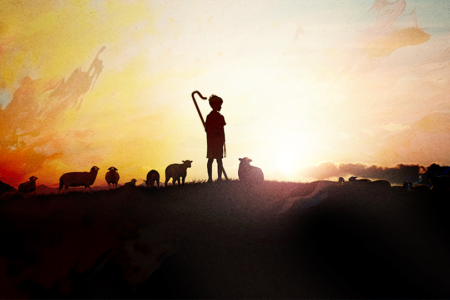The Warrior King
It’s one thing to fight for yourself. It’s another thing to fight like David.
The acronym SERE refers to military training for Survival, Evasion, Resistance, and Escape. It prepares U.S. combatants for wilderness survival, enemy evasion, and (when necessary) self-defense while outnumbered. Entire careers are dedicated to making SERE skills second nature in the special-warfare community, and social media is saturated with stories of modern warriors defying the odds with such skills.
King David may not readily come to mind when it comes to SERE, but he could be called the archetype for special-operations warfare. When David navigated the Judean wilderness as he fled from a crazed King Saul, he was tough and completely at home with the very conditions modern militaries work hard to reproduce for training.
He didn’t prepare for battle by taking pass/fail classes but by handling situations that often meant life or death. Through it all, he clung to the Lord, who was his strength and his shield (Ps. 28:7).
Facing the King
When King Saul needed someone to play the kinnor, an ancient Hebrew lyre, Saul’s servant recommended the young shepherd David, describing him as “a mighty man of valor, a man of war,” even before he had proven himself against Goliath (1 Sam. 16:18).
David earned this reputation by killing wild animals while defending his flocks; and his good name grew greater after he faced down the Philistines’ formidable champion, Goliath of Gath. (See “David and Goliath,” page 30.)
The battle between David and Goliath was a defining moment for David, but the scene was more about David and Saul than David and Goliath. At a time when the average Israelite was around 5 feet 3 inches, Goliath stood at “six cubits and a span” (17:4), which translates to 9 feet 9 inches. Yet his stature did not phase David.
King Saul stood head and shoulders above the rest of his people (9:2; 10:23) and didn’t cite Goliath’s height as the threat. Instead, he told David, “You are not able to go against this Philistine to fight with him; for you are a youth, and he a man of war from his youth” (17:33). Goliath’s reputation led Saul to lack the confidence in the Lord that David possessed.
Initially, Saul enhanced his own rule with David’s strength, setting him over Israel’s warriors (18:5). However, David’s popularity as a greater warrior than Saul spawned jealousy within the king, who began classifying David as a threat to his rule (vv. 7–9). So, Saul began to plot against David, forcing David to flee. We can infer from Scripture that David was a fugitive for five to seven years.
David used this period to demonstrate the type of leader he was. He commanded the respect of other warriors, men who would not follow someone weak into battle. Collectively, David’s entourage possessed the skills for survival and guerilla warfare that modern soldiers would envy. David nobly led his 600 men to deliver an entire town, Keilah, from the attacking Philistines while evading Saul (23:1–13).
Furthermore, David demonstrated dependence on God’s will throughout that campaign, displaying humility, in contrast to Saul, who previously ordered the execution of 85 of the Lord’s priests and their village, Nob, for helping David (22:6–23).
Eventually, David and his men escaped to the land of the Philistines—Goliath country—where David ingratiated himself to Achish, king of Gath; and he dwelt there, “he and his men, each man with his household, and David with his two wives” (27:3), for “one full year and four months” (v. 7). Achish, in fact, gave David the city of Ziklag.
Achish thought David was fighting the Israelites for him. But instead, David would raid Israel’s enemies; kill everyone; and seize all the livestock. When the Amalekites raided Ziklag, burned it down, and captured everyone, David’s warriors wept “until they had no more power to weep” (30:4). Then they “spoke of stoning [David], because the soul of all the people was grieved, every man for his sons and his daughters. But David strengthened himself in the LORD his God” (v. 6).
David asked the Lord if he should pursue the Amalekites. When the Lord said yes, David “attacked them from twilight until the evening of the next day” and recovered everything (v. 17).
Twice David had opportunity to kill Saul but refused. Saul eventually died in battle, but “the LORD preserved David wherever he went” (1 Chr. 18:13). David defeated many of Israel’s enemies, including the Philistines, Moabites, Syrians, Edomites, Ammonites, and Amalekites (vv. 1–11). He and his band, spearheaded by 37 “mighty men” (2 Sam. 23:8), led Israel’s armies to many victories that allowed him to build his kingdom and remove numerous enemies from the land, giving his son Solomon rest and opportunity to build the Temple for the Lord.
His Identity as a Man of War
It’s a mistake to criticize what some see as David’s legacy of bloodshed. God blessed David, used him to fight pagans He wanted destroyed, and often was intimately involved in leading David’s victories (2 Sam. 5:19–25). One of the reasons God rejected Saul was because Saul refused to destroy all the Amalekites, as instructed (1 Sam. 15).
In a culture today that stresses social justice, it’s easy to forget that God is righteous and hates evil. His thoughts are not our thoughts, nor are His ways our ways (Isa. 55:8). David was doing God’s will.
God also used David’s experiences to compose half of the book of Psalms. A journey to some of the places where David fled from Saul, like En Gedi (1 Sam. 23:29) and possibly the area that today is Masada (24:22), will change both the way we read the Psalms and our perception of David.
David’s warrior history is often treated contemptuously because God forbade a man with so much blood on his hands to build His holy Temple (1 Chr. 22:8). However, the stipulation was about glorifying God, not disgracing David. Solomon, too, acknowledged that David’s wars and the Temple’s postponement were part of God’s design (1 Ki. 5:3).
God used these rulers to establish a prophetic pattern. As long as Israel wasn’t secure, God preferred being on the move in a tent, like His people. But when rest came for Israel, God allowed a permanent dwelling for His presence. The rest pictured in Solomon’s time, not David’s, foreshadows the latter days the prophet Isaiah predicted, when “the LORD’s house shall be established . . . and all nations shall flow to it. Nation shall not lift up sword against nation, neither shall they learn war anymore” (Isa. 2:2, 4).
Photo: Adobe Stock







